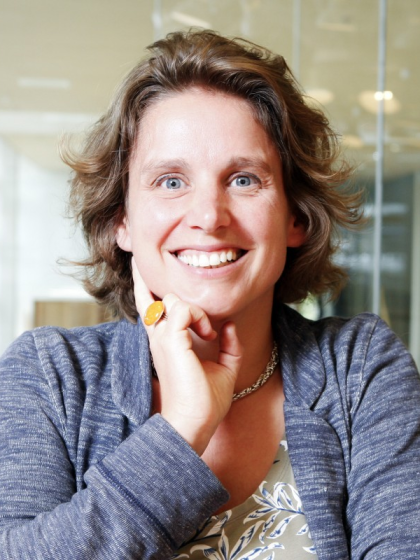prof. dr. L.M. (Liesbeth) Veenhoff

Research interests
Liesbeth Marian Veenhoff
Born 23-11-1972, NL
Partner of Jan Jacob Schuringa, mother of two born 2003 and 2005
Address: European Research Inst. for the Biology of Ageing, University Medical Center Groningen; Antonius Deusinglaan 1; room 205, 9713 AV Groningen; The Netherlands
email: l.m.veenhoff@rug.nl
Training
Master: University of Groningen; August 1996; Biology (Biochemistry/Molecular Biology)
PhD: University of Groningen; 7 September 2001, supervisor Prof. Dr. Poolman; Cum Laude
Work experience since completing PhD
2002-2003 post doctoral HFSP fellow, Rockefeller University (New York, USA), 1fte
2004-2010 post doctoral veni & vidi fellow, University of Groningen (NL), 0.8fte
2010-2012 Assistant Prof, University Medical Center Groningen (NL), 1fte
2012-present Group leader European Research Institute for the Biology of Ageing (ERIBA), University Medical Center Groningen (NL)
(UHD/Associate Prof since 2015, ius promovendi since 2018),
Brief summary of research over the last five years
My group has made important contributions in the nuclear transport field studying the mechanism of transport of membrane proteins. Specifically, we discovered that, while the majority of membrane proteins simply reach the inner membrane by diffusion, a selective and energy-dependent transport mechanism exists for two yeast proteins, and likely for a third human protein. Intriguingly, these three proteins all act in nuclear pore complex (NPC) assembly and quality control, which led me to question whether this special transport mechanism may be important for NPC quality control.
In collaboration with others, my team developed new methods and generated a first system-wide inventory of the molecular changes in mitotic ageing yeast. We found that a major signature of ageing cells is an altered stoichiometry in protein complexes, which was particularly strong for the NPC.
To then answer the many unresolved questions with regard to the function of the NPCs in ageing cells, we follow nuclear transport in ageing yeast cells. Using microfluidic devices, we monitor cells over their entire life span under perfectly controlled environmental conditions. My team found that NPC quality control is compromised in ageing cells, and associated with reduced transport across the nuclear envelope.
Altogether, my research lines—related to the function of the NPC, on the one hand, and to understanding what cellular ageing is on a molecular level, on the other—have now converged and jointly point to the importance of NPC quality control.
Grants, scholarships and prizes
PI
2020 'Quality control of nuclear pores', NWO-Vici Science Domain
2020 'Guardians of protein disorder', NWO-XL Science Domain (previously ENW-GROOT) consortium grant, I act as project leader.
2017 'Unravelling the molecular mechanism of impaired nuclear transport in ALS' Netherlands Organization for Scientific Research (BBoL-NWO)
2016 Aspasia, Netherlands Organization for Scientific Reserach (NWO)
2015 'A mother’s sacrifice: asymmetric inheritance of ageing factors' Netherlands Organization for Scientific Reserach (NWO-ALW)
2013 ‘Aging of the Nuclear Pore Complex: relating structure and function’ Netherlands Organization for Scientific Research (ECHO-NWO).
2008 ‘Composition, function, and dynamics of the yeast nuclear envelope’ financed by the Netherlands Organization for Scientific Research (Vidi-NWO)
2004 Veni-NWO
2002 Human Frontiers Fellowship long term fellowship
2001 My thesis 'Mechanistic aspects and structural organization of a secondary sugar transporter' was awarded with the honour 'Cum laude' representing the top 5 % of PhD theses.
1996 The Unilever Research Award 1996 for the best master student research project ‘Purification and reconstitution of transport proteins’.
Co-PI
2010 Co-author on the proposal for the Systems Biology Centre for Energy Metabolism and Ageing. Funding for 1 PhD student, project leader. (NWO)
2008 Co-author on collaborative project “transport through a polymer network”. Funding for 1 PhD student. (Zernike institute for Advanced Material)
2008 The Netherlands Proteomics Centre funds proteome research on the yeast nucleus. Funding for 1 PhD student.
